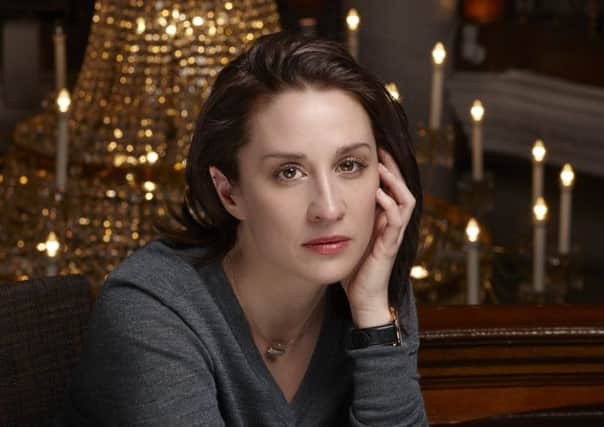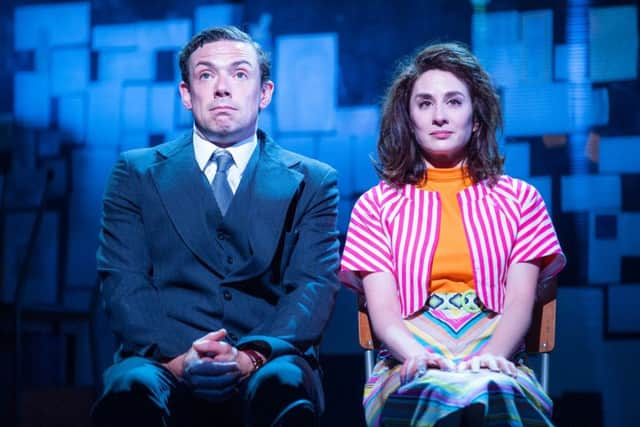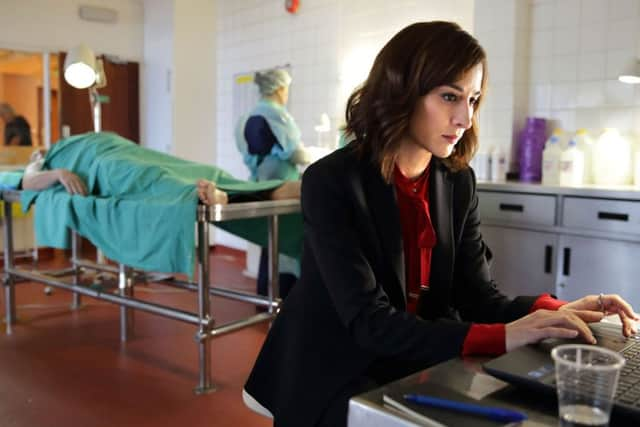Interview: Scots actress Morven Christie on the power of saying '˜no'


Billy Connolly used to tell a story about when he was a shipyard worker who spent his weekends on TA exercises, travelling to the other end of the country to “shoot” someone who turned out to work in the same place; the punchline being that he could have saved a lot of time and trouble by sneaking up on him in the staff canteen. I repeat this to Morven Christie when we finally meet in a cafe in Glasgow’s Merchant City after a protracted e-mail exchange with a London-based PR about when I would catch her down there doing publicity for The A Word, a six-part BBC One drama about a family dealing with autism.
It was Morven, who when asked, came up with the solution. “Why don’t we just meet in Scotland?” she’d said. She laughs at the Connolly joke and also at the absurdity of the situation. It’s all about communication.
Advertisement
Hide AdCommunication, suggests Christie, is at the heart of The A Word, which follows the Hughes family’s struggle to help five-year-old Joe (Max Vento) after a diagnosis that he is on the autistic spectrum. Christie plays his mum, Alison, Lee Ingleby his dad, Paul, Molly Wright is 16-year-old sister Rebecca and Christopher Eccleston is grandad Maurice. His uncle Greg McHugh and his partner Vinette Robinson have their own issues with the aftermath of an affair. Throw into this mix the quotidian challenges such as making a living and bereavement and you’ve got all of the ingredients for a great drama, which writer Peter Bowker has skilfully laced with humour.


“Joe’s autism puts a magnifying glass on all the little faultlines in relationships within that family and where they’re not communicating becomes really apparent,” says Christie. “Autism is part of the story, but it’s not all of it because we all have families who fail to communicate anyway. This family are aspirational, intelligent, have fun together yet still they fail at this, and at being able to talk to each other. And things begin to fall apart when cracks they didn’t realise they had begin to widen.”
Faced with the realisation they’re going to have to work hard to help their son communicate, Alison and her husband respond in very different ways and go down different avenues, but both are in denial.
“Paul is ‘oh, it’s no big deal’, while Alison goes at it 100 miles an hour. She’s over-engaging, he’s under-engaging, and they’re both judging each other and where they’re failing,” says Christie. “Peter Bowker spent 14 years working with special needs children and has written a family that is recognisable and natural. And what’s brilliant is the way he bounces comedy off tragedy all the time, from line to line, back and forward, between desperately sad and funny, and what that means is that both land more heavily. You feel something poignant much more strongly if you’ve laughed immediately before. It gets sadder as circumstances go on in the series, but Pete manages to always have release valves.”
The A Word is a beautifully self-contained six-episode story but it’s one Christie wouldn’t mind revisiting in future, to see how Joe changes and the family copes as he grows up.


“Do they come together, or grow more apart? There’s a lot of love there, but a lot of cracks, so yeah, it would be a good story to revisit.”
Advertisement
Hide AdBorn in Helensburgh, where she “lived for 15 minutes” before being raised in Glasgow and Aviemore – “my family were big into skiing” – as well as The A Word, she’s also currently on our screens in ITV detective drama Grantchester, and Murder on BBC2, a three-part series commissioned from the original 2013 BAFTA best Single Drama winner. She’s done Doctor Who, Hunted andTwenty Twelve. Theatre includes work with Sam Mendes in The Cherry Orchard and The Winter’s Tale.
After 12 years in London she took the opportunity to move back to Glasgow last year and is loving reconnecting with the city and Scotland. “I was just fatigued with London,” she says. “I think it was essentially my tempo is one of Scotland, a little bit slower, that kind of ‘woooo!’ just gets a bit much. I think people are reflections of where they’re from and Scottish people are used to having a connection with the land, like you can be in the city and within 20 minutes be in the middle of nowhere and have a big view. And also, every time I was working, I was away, so I thought, ‘why do I need to be in London? Why can’t home be wherever you want it to be?’ I have loved being back. For work it’s not made a lot of difference because I’m in my mid-thirties and established at a certain point so I’m not auditioning for things five days a week, and nowadays for most castings you’re asked to shoot a tape.”
Advertisement
Hide AdWith The A Word filmed in the Lake District and Manchester, and Grantchester filmed in Cambridgeshire and London, plus jobs in Sheffield and Cardiff, Morven has been able to base herself in Glasgow, but does have to be willing to jump on a plane or train. “At the moment with lots of things coming out, I need to be down in London for a bit to cut out some of the travelling, but I’m keeping my flat here. Yeah, this is home, absolutely. I’m the human ping-pong ball,” she says.


And with that the human ping pong ball orders a restoring green tea and a piece of cake as she settles in to talk about how much she enjoyed playing the part of Alison in The A Word.
“It’s a long time since I’ve played someone that’s got under my skin the way she did, because she’s not necessarily dealing with it the way we all like to think we would. She does the wrong thing a lot and everyone’s judging. Families especially feel free to comment and this one does, but she doesn’t have time to deal with that. From the second she wakes up to the second she goes to sleep, she is thinking about how she is going to make this world easier for her son to walk through and her son more capable of walking through it. She doesn’t have time to think about whether or not that pleases anybody else. And I think that’s heroic, that single-minded purpose. Whether she’s making the right choices along the way or not is irrelevant, her will is heroic. But playing her was intense. Luckily it was a massively happy cast and crew, the most positive thing I’ve ever been part of, which gave me the space to feel safe and really go for it.”
She and Lee Ingleby found a way of shaking off the intensity of the drama.
“We went to the pub almost every night and just had a drink, and went ‘bleuggghhh!’ Otherwise you’re just carrying it home with you. And on the weekends I was back here, which helped, although there was one weekend in the Lake District when we were filming and it snowed and we all bought sledges and climbed one of the fells and sledged all day. It was brilliant, exactly what we needed because it’s heavy, a lot of it, intense.”


Praise has been heaped on her little co-star, Max Vento, who plays Joe, and Christie says he was a brilliant barometer for how things were going during filming. “He’s a little livewire and if filming was dragging on he’s like, ‘I don’t want to do this any more!’ So you go, OK, and it was sort of like working with a very, very difficult older male actor.” She laughs.
Has she worked with many of those?
Advertisement
Hide Ad“A few and no, I can’t name them. They’re more difficult than older female actors because they’ve had it easier. Female actors have always had periods of unemployment, always had to struggle much more than men.” Sipping her tea, Christie warms to her theme, saying: “There are four times as many actresses as there are actors, and four times fewer parts than there are for men. We need more female writers.”
This is something Christie is taking on personally, writing a script with a female central character. Now in her mid-thirties, writing and possibly directing hold an appeal.
Advertisement
Hide Ad“In Alison, Peter has written a great female character, but a male writer can never be inside her perspective, in the way that, for example, Sally Wainwright has written Sarah Lancashire’s character in Happy Valley. There’s a holistic perspective there because she’s a woman so she can write her being nasty, she can write her being funny, she can write her being all the colours of the rainbow because she is completely aware that we are all these things.
“It’s not that men aren’t writing female parts, it’s that they’re writing them from their own, male perspective. So even the brilliant ones, they still have that limitation. So I think we need women writing women’s experiences and historically, where some writers and directors have succeeded, they have done it the boys’ way, writing masculine stories, masculine environments.
“That expression, strong female character…” she snorts.
Feisty… I throw in for good measure.
“Yeah, feisty. Can we please not use the word feisty ever again! It’s a word that’s only ever used about women. What does it mean?” She laughs in exasperation. “What does it mean? That you stand up for yourself, that you’re not meek? It’s an extraordinary thing. You would never describe a man as feisty.”
Interestingly, her character in Murder was originally written for a man but changed to a woman after Christie auditioned for another part.
“They’d changed nothing, except her name. With the format of the show they’d broken so many conventions anyway, and the producer Kath Mattock is a break it, change it, screw it sort of person. But it’s rare somebody does that.”
Acting wasn’t something Christie knew she wanted to do until a communications course at Telford College in Edinburgh turned into an acting course and an application to the Drama Centre in London.
Advertisement
Hide Ad“I had loads of jobs after I left school at 16: ski instructor, waitress, shop assistant, ski boot fitter, I’ve always been a doing person. Then once I knew I wanted to act, having done none of it, I ended up with the most complicated actor training you could do. Because Drama Centre is full-on, intensive and in some ways probably the most intellectual, which is almost the opposite of what I am.
“But I wanted to go there because there was something so exhaustive about it. It was, if you’re not prepared to believe and sweat and cry and put 14 hours a day into this and be rejected endlessly, then don’t apply. They viewed it as training for a trade and expected you to work hard.”
Advertisement
Hide AdSo far Morven’s career has taken in a variety of roles, from police officer to space traveller, each different from the last. In Grantchester, also on our screens right now, Christie plays Amanda Hopkins, forbidden love interest of sleuth vicar Sidney Chambers (James Norton).
“Amanda and Alison are very different, if nothing else just because of the time they exist. Alison says whatever she damn well pleases and Amanda in the 1950s doesn’t have that privilege. She’s limited, trapped. They’ve got a strong will in common, but Alison has much more scope to do something with it. With Alison it’s more extreme and the role is big enough and tough enough to throw myself against and bruise,” she says.
“I realised recently that I bounce in the opposite direction after each character. After the first series of Grantchester I did Murder, then after the second series I did The A Word and I remember when I was at the RSC thinking, ‘when this is over I want to play a junkie’. Sometimes when you’ve done something incredibly serious you just need to go and have a laugh. Like Doctor Who, that was a brilliant laugh, six weeks of fun.
“And I always learn something from each one that I needed to learn. Like Alison does things her own way and just as I was coming in to playing her I was feeling the opposite, apologising a lot. By the time I came out of playing her I felt, if I’ve done something I need to apologise for I will, but I’m not going to apologise for myself. Which is probably something I knew ten years ago, but somehow I’d lost it. Alison gave me that back.”
She continues, “And Murder was difficult on a technical level because of the convention of doing monologues into a black lens. You can see yourself reflected in it, which for me is like death, but it did me the world of good, because I had probably been a bit scared of the camera, being primarily a theatre actor for quite a long time. I had to stare it down and get over the barrier. So I’m sort of loving screen stuff at the moment, but I’ll always come back to theatre because I love the process, doing the whole story each night and finding your way through it. But it’s not like you can sit down and say ‘I will do this or that role’. The only power you have as an actress is to say no, which I frequently do. Seventy-five per cent of the scripts I get sent I say, ‘that’s not for me’. I’m not into comedy, I like to laugh, but that idea of trying to make someone laugh, I’m not sure… and anything misogynistic. If there’s a character that feels like a male fantasy… well, they don’t come to me any more, I’ve said no so many times.”
So she’s too ‘feisty’? She laughs. “Yes, it’s because I’m ‘feisty’. I worked with a director who told me I had a reputation for being picky. I thought that was extraordinary because the only power you have is what you choose not to be part of. I wish I’d understood that when I started out because there are things I’ve done I wish I hadn’t.”
Advertisement
Hide AdSuch as? “I did a series that was meant to be big and flash and there were sex scenes in it and nudity that got sprung on me as it went on. I did a scene that there was no reason to have other than an American channel had said we’d like some nudity in this episode please. And once it’s on screen out there, it never goes away.”
Nowadays Christie is searching for authenticity when she reads a script, and actively prefers the perhaps less immediately likeable characters.
Advertisement
Hide Ad“It’s very easy to play pleasant, but I’m more interested in someone that’s a bit antagonistic or insufferable and why they’re like that. With Alison I’d think ‘arg, why’s she doing that?’ And then you’d think, ‘no I probably would do that’. She’s exactly the kind of challenge you want. There’s a truth you might not want to admit.
“Ultimately, the reason I want to be an actor is to do with making people understand each other better. I remember doing Romeo and Juliet and thinking, ‘if there’s one 13-year-old in the audience that feels less alone, you’ve done something good’. So I’ll always be drawn to the stories that maybe people haven’t told yet or aren’t so keen to tell. The hidden, more interesting ones.”
Which brings us back to the C word. Communication.